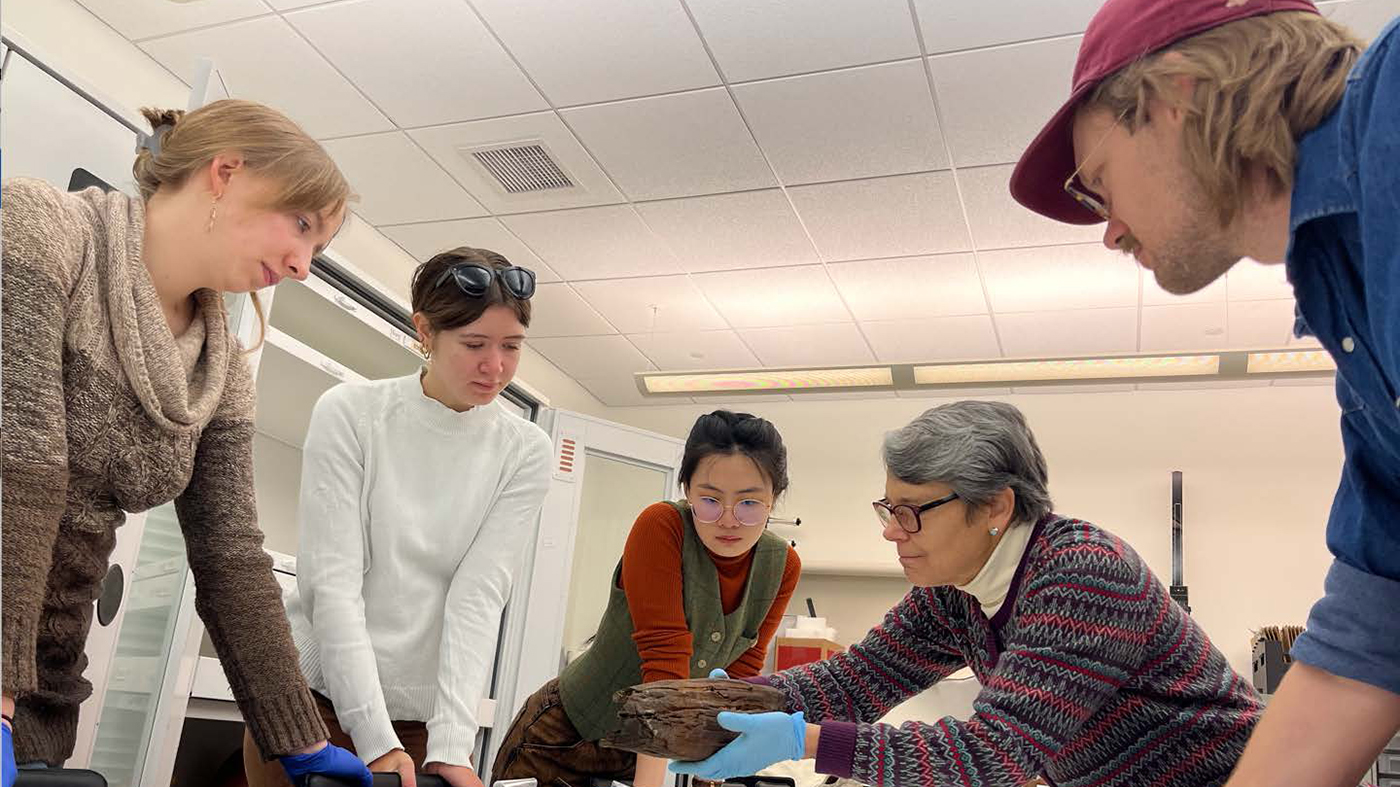Radiocarbon Dating Reveals True Age of Artifacts in a Student-Curated Show on Southwestern Florida, Opening at Penn Museum

PHILADELPHIA—Using radiocarbon dating technology, researchers at the Penn Museum have determined the age of four artifacts that will be on display in a new undergraduate studentcurated exhibition, Key Questions: Unlocking Florida’s Ancient Past, which opens Saturday, March 25, 2023.
Key Questions features a selection of artifacts that offer clues into the daily lives of Indigenous people who lived along Florida’s southwestern coast hundreds of years ago. Made of wood and plant fiber, these artifacts are “rare finds” that would have disintegrated under typical environmental conditions. However, the waterlogged conditions at Key Marco provided a naturally occurring “preservation capsule”—a pit of muck shielding the objects from oxygen— making them a rarity for archaeologists.
Exceptionally preserved when they were first uncovered in 1896, previous analyses of the artifacts dated them between 55-1670 CE. But, while developing Key Questions, its student curators worked with Museum conservators to take samples from four objects where there were no signs of a previous treatment: a panther tooth, fishing net, wooden vessel, and residue from ceramic sherds. The radiocarbon dating revealed that all four artifacts, which will be on view in the exhibition, were actually from 1200-1300 CE—making them nearly 800 years old.
“This is huge,” says Dr. Sarah Linn, the Assistant Director of Academic Engagement at the Penn Museum. “This consistency [in dating for all four objects] could suggest a date for this incredibly important archaeological site. This is the first time we’ve done scientific analysis as a part of the annual student show, and while it took some time and effort, it was wonderfully successful. We’re all thrilled.”
Key Questions uses archaeological science to add new insights about how the people of Key Marco capitalized on their rich, coastal environment to create objects they used in their daily lives—from intriguing wooden masks to tools made of shells. It also underscores how innovative research can lead to even more unanswered questions, paving a pathway for future anthropological and archaeological study.
Its undergraduate student curators are Anna Hoppel, a senior Fine Arts major from Philadelphia; Qi Liu, a junior Anthropology and Art History major from Beijing; and Sydney Kahn, a junior Anthropology major from Woodstock, Georgia, who says the point of Key Questions is that museums are still looking for answers.
“An exhibition is not a capstone of knowledge, so much as a progress point where researchers are excited to share what they’ve learned,” says Kahn, who says people hundreds of years ago shared the same needs as people today: food, shelter, warmth, joy, and relationships. “Examining the objects as a proxy for those innately human experiences brings us closer to them. We all have some meaning to be found in learning about our shared past. We’re curious to see what visitors think, so we created this exhibit with an inquisitive, interactive format.”
Key Questions invites Museum visitors to share their own questions to prompt further research, and access to the exhibition is included with admission.
The show marks the culmination of the 2022-23 Student Exhibition Internship Program, which selects three undergraduates each year to curate their own show at the Penn Museum.
“This unique paid internship opportunity immerses the students in the curatorial process—from concept development to design to planning public programs,” Linn explains. “Over the course of the academic year, the student curators work with almost every department in the Museum and learn the joys and challenges of telling a story through objects.”
###
About the Penn Museum
The Penn Museum’s mission is to be a center for inquiry and the ongoing exploration of humanity for our University of Pennsylvania, regional, national, and global communities, following ethical standards and practices.
Through conducting research, stewarding collections, creating learning opportunities, sharing stories, and creating experiences that expand access to archaeology and anthropology, the Museum builds empathy and connections across diverse cultures
The Penn Museum is open Tuesday-Sunday, 10:00 am-5:00 pm. It is open until 8:00 pm on first Wednesdays of the month. The Café is open Tuesday-Thursday, 9:00 am-3:00 pm and Friday and Saturday, 10:00 am-3:00 pm. On Sundays, the Café is open 10:30 am-2:30 pm. For information, visit www.penn.museum, call 215.898.4000, or follow @PennMuseum on social media.



